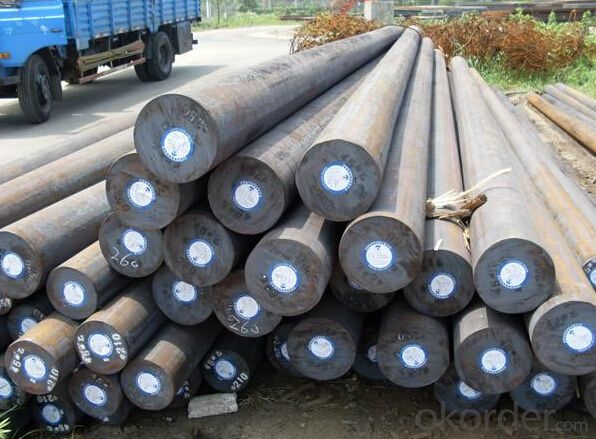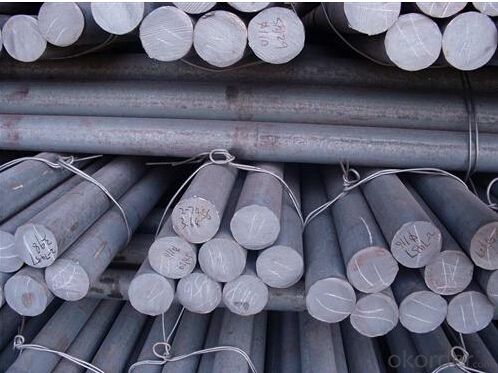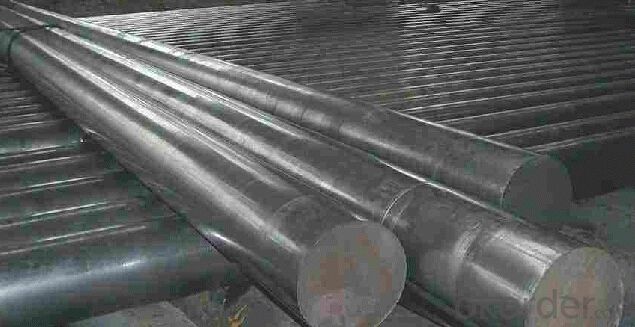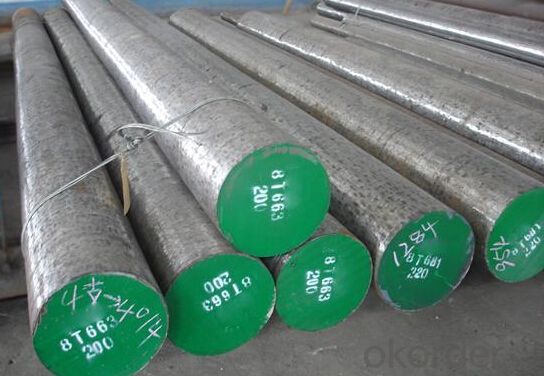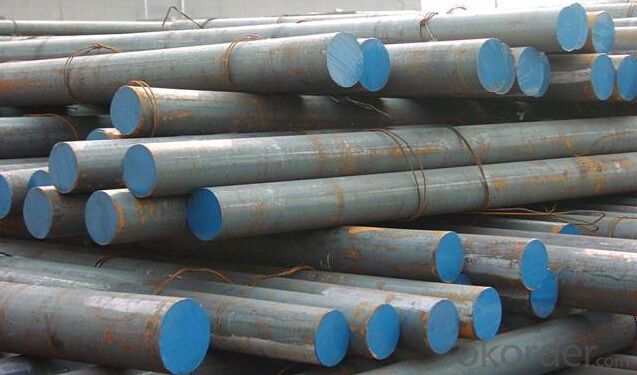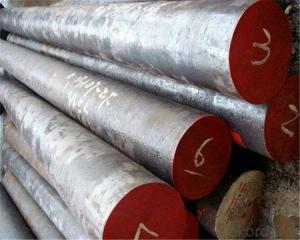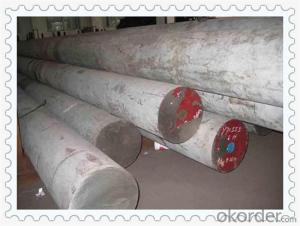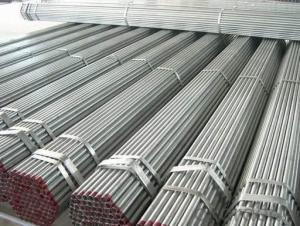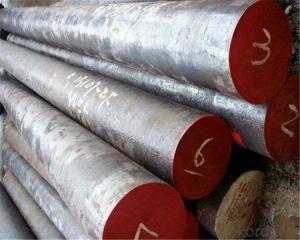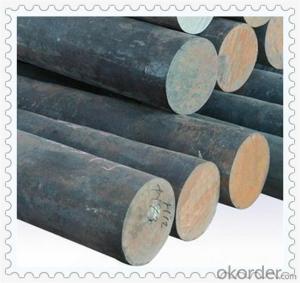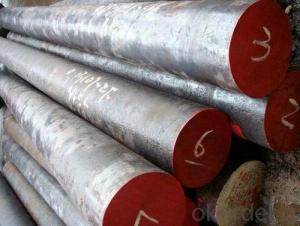Grade AISI 4140,42CrMo, SCM440 Alloy Steel Round Bar
- Loading Port:
- Shanghai
- Payment Terms:
- TT OR LC
- Min Order Qty:
- 30 m.t
- Supply Capability:
- 10000 m.t/month
OKorder Service Pledge
OKorder Financial Service
You Might Also Like
Specification
Specifications of Round Bar
Produce Standard: GB, AISI, ASTM, SAE, EN, BS, DIN, JIS
Produce Processes: Smelt Iron -EAF smelt Billet - ESR smelt Billet -Hot rolled or forged get the steel round bar and plate
Heat Treatment; Normalized / Annealed / Quenched+Tempered
Quality Assurance:All order we can received third party inspection, You can let SGS, BV,.. and others test company test and inspect our products before Goods shipping.
Equivement Grade
GB | 20# | 35# | 45# | 20Cr | 40Cr | 35CrMo | 42CrMo | GCr15 | 60Si2MnA | 65Mn |
AISI | 1020 | 1035 | 1045 | 5120 | 5140 | 4135 | 4140 | 52100 | 9260 | 1065 |
JIS | s20c | s35c | s45c | scr435 | scr440 | scm435 | scm440 | suj2 | sup7 | - |
DIN | c20 | c35 | c45 | 20cr4 | 41cr4 | 35crmo4 | 42crmo4 | 100cr6 | 65si7 |
|
Chemical Composition
Grade | Dia.(mm) | C | Si | Mn | Cr | P | S | Ni | Cu | Mo |
1020 | 16-280 | 0.17-0.25 | 0.17-0.37 | 0.35-0.65 | ≤0.15 | ≤0.035 | ≤0.035 | ≤0.30 | ≤0.25 |
|
1035 | 16-300 | 0.32-0.40 | 0.17-0.37 | 0.50-0.80 | ≤0.25 | ≤0.035 | ≤0.035 | ≤0.25 | ≤0.25 |
|
1045 | 16-430 | 0.42-0.50 | 0.17-0.37 | 0.50-0.80 | ≤0.25 | ≤0.035 | ≤0.035 | ≤0.30 | ≤0.25 |
|
5120 | 16-85 | 0.18-0.24 | 0.17-0.37 | 0.50-0.80 | 0.70-1.00 | ≤0.035 | ≤0.035 | ≤0.03 | ≤0.03 |
|
5140 | 16-400 | 0.37-0.44 | 0.17-0.37 | 0.50-0.80 | 0.80-1.10 | ≤0.035 | ≤0.035 | ≤0.30 | ≤0.03 |
|
4135 | 13-230 | 0.32-0.40 | 0.17-0.37 | 0.40-0.70 | 0.80-1.10 | ≤0.035 | ≤0.035 | ≤0.03 | ≤0.03 | 0.15-0.25 |
4140 | 13-360 | 0.38-0.45 | 0.17-0.37 | 0.50-0.80 | 0.90-1.20 | ≤0.035 | ≤0.035 | ≤0.03 | ≤0.03 | 0.15-0.25 |
52100 | 21-400 | 0.95-1.05 | 0.15-0.35 | 0.20-0.40 | 1.30-1.65 | ≤0.027 | ≤0.02 | ≤0.30 | ≤0.025 | ≤0.10 |
9260 | 20-60 | 0.56-0.60 | 1.50-2.00 | 0.60-0.90 | ≤0.35 | ≤0.035 | ≤0.035 | ≤0.35 | ≤0.20 |
|
1566 | 16-80 | 0.62-0.70 | 0.17-0.37 | 0.90-1.20 | ≤0.25 | ≤0.035 | ≤0.035 | ≤0.30 | ≤0.25 |
|
Our Featured Products
Alloy steel: Combination of steel / Bearing steel// Spring steel/ Cr- mo steel
GB 20Cr/ 40Cr / 42CrMo / 35CrMo/ 20CrMn/GCr15/30CrMnTi…
ASTM 5120 /5140 / 4140/ 4135/ 5152/52100…
JIS SCr420H/ SCr440/ SCM3/ SUP9/SUJ2…
Carbon steel: Carbon tool steel /Carbon Structural Steel
GB 20/ 35 /45/…
ASTM 1020/ 1030/1045…
JIS S20C/ S30C / S45C…
Usage and Applications of Round Bar
1. Chinese standard steel bar is often used where large amounts of steel need to be formed, for example as structural steel.
2. And we can use this kind of product on the performance of the mechanical parts if the demand is not very high.
3. Steel round bar is used in construction and a large number of architectural and engineering structures.
Packaging & Delivery of Round Bar
Packaging Detail: All goods are packed in bundle with steel strips and shipped by break bulk vessel or container (depend on target market and different ports)
Delivery Detail: 15~45 days
Trade terms: FOB, CFR, CIF
MOQ: 30 metric tons per specification; we can negotiate the quantity if the specification is normal or we have stock of one specification.
Weight: Theprice invoicing on theoretical weight basis or actual weight basis depends on customer’s request.
Shipment: The shipment of bulk break or container is depends on customer’s request and the situation of the port of destination.
Documents given: Full set of original clean on board bill of lading; Original signed commercial invoice; Original packing list; Policy of insurance; Certificate of origin and what the target market needs.
FAQ:
Q1: Why buy Materials & Equipment from OKorder.com?
A1: All products offered byOKorder.com are carefully selected from China's most reliable manufacturing enterprises. Through its ISO certifications, OKorder.com adheres to the highest standards and a commitment to supply chain safety and customer satisfaction.
Q2: How do we guarantee the quality of our products?
A2: We have established an advanced quality management system which conducts strict quality tests at every step, from raw materials to the final product. At the same time, we provide extensive follow-up service assurances as required.
Q3: How soon can we receive the product after purchase?
A3: Within three days of placing an order, we will begin production. The specific shipping date is dependent upon international and government factors, but is typically 7 to 10 workdays.
Q4: What makes stainless steel stainless?
A4: Stainless steel must contain at least 10.5 % chromium. It is this element that reacts with the oxygen in the air to form a complex chrome-oxide surface layer that is invisible but strong enough to prevent further oxygen from "staining" (rusting) the surface. Higher levels of chromium and the addition of other alloying elements such as nickel and molybdenum enhance this surface layer and improve the corrosion resistance of the stainless material.
Q5: Can stainless steel rust?
A5: Stainless does not "rust" as you think of regular steel rusting with a red oxide on the surface that flakes off. If you see red rust it is probably due to some iron particles that have contaminated the surface of the stainless steel and it is these iron particles that are rusting. Look at the source of the rusting and see if you can remove it from the surface.
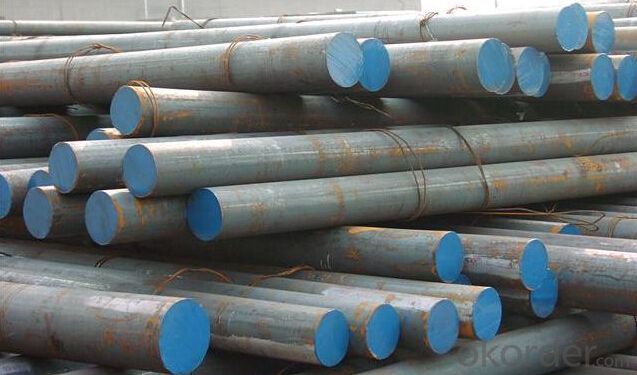
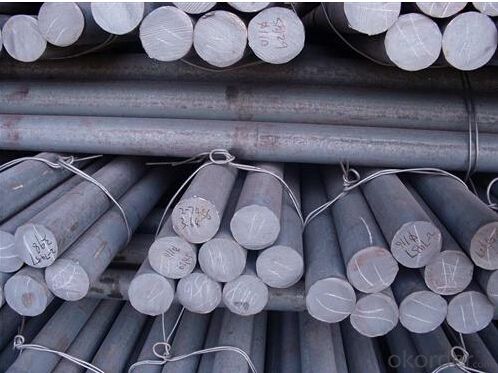
- Q: Can special steel be used for medical applications?
- Yes, special steel can be used for medical applications. Specialized types of stainless steel, such as AISI 316L or 316LVM, are commonly used in medical devices and implants due to their excellent corrosion resistance, biocompatibility, and strength. These steels are often used in surgical instruments, orthopedic implants, cardiovascular devices, and many other medical applications.
- Q: What are the different alloying elements used in special steel?
- There are several different alloying elements used in special steel, including chromium, nickel, molybdenum, vanadium, tungsten, cobalt, and manganese. These elements are added in varying amounts to enhance the steel's properties such as strength, corrosion resistance, hardness, and heat resistance.
- Q: What are the different electrical grades of special steel?
- There are several electrical grades of special steel that are specifically designed to have superior electrical properties. These grades include: 1. Electrical Silicon Steel: This grade of special steel contains a high percentage of silicon, typically around 3-4%. The presence of silicon helps to minimize eddy current losses and improve the magnetic properties of the steel, making it ideal for use in electrical transformers and motors. 2. Electrical Stainless Steel: This grade of special steel is made from stainless steel alloys, which are known for their excellent corrosion resistance. The electrical stainless steel has a low electrical resistivity and high thermal conductivity, making it suitable for electrical connectors, terminals, and other components that require good electrical conductivity and resistance to oxidation. 3. Electrical Tool Steel: Tool steels are commonly used in the manufacturing of various tools and dies. Some tool steels are specifically formulated to have improved electrical properties, including high electrical conductivity and resistance to heat. These grades are often used in the production of electrical contacts, switches, and other electrical components that require high wear resistance and good electrical performance. 4. Electrical Copper-Clad Steel: This grade of special steel is made by bonding a layer of copper to a steel core. The copper layer provides excellent electrical conductivity, while the steel core provides strength and durability. Electrical copper-clad steel is commonly used in applications where high electrical conductivity is required, such as in power transmission lines and grounding systems. Overall, the different electrical grades of special steel offer a range of electrical properties to meet the specific needs of various electrical applications. These grades are carefully engineered to provide optimal electrical performance, durability, and resistance to corrosion and wear.
- Q: Is special steel resistant to chemical corrosion?
- Yes, special steel is generally resistant to chemical corrosion. Special steel, also known as stainless steel, is a type of alloy that contains a minimum of 10.5% chromium. The addition of chromium in the steel composition forms a passive oxide layer on the surface, which acts as a protective barrier against corrosion. This oxide layer is highly stable and prevents the steel from reacting with various chemicals and corrosive substances. Additionally, special steel may also contain other alloying elements such as nickel, molybdenum, and titanium, which further enhance its resistance to chemical corrosion. These elements increase the steel's ability to withstand exposure to acids, alkalis, salts, and other corrosive agents commonly found in industrial and environmental settings. However, it is important to note that the resistance of special steel to chemical corrosion may vary depending on the specific grade and composition. Different grades of stainless steel offer different levels of corrosion resistance, and it is crucial to select the appropriate grade based on the intended application and the specific corrosive environment. In summary, while special steel is generally resistant to chemical corrosion, the specific resistance can vary depending on the grade and composition. Therefore, it is essential to consider the specific requirements and consult with experts to choose the most suitable special steel for a particular application.
- Q: How does special steel contribute to reducing product waste?
- Special steel contributes to reducing product waste by offering enhanced durability and strength. This allows manufacturers to produce longer-lasting and more reliable products, minimizing the need for frequent replacements or repairs. By using special steel, products can withstand harsh conditions, wear and tear, and stress, resulting in reduced waste as they have a longer lifespan. Additionally, special steel's superior properties enable the production of lighter and more efficient components, leading to reduced material consumption and waste during the manufacturing process.
- Q: How does special steel compare to other materials like aluminum or titanium?
- Special steel is known for its exceptional strength, durability, and resistance to corrosion, making it a popular choice for various applications. Compared to materials like aluminum or titanium, special steel often offers superior strength and toughness, making it suitable for heavy-duty industries such as construction, automotive, and aerospace. While aluminum is lightweight and has good corrosion resistance, it may lack the necessary strength for certain demanding applications. Titanium, on the other hand, is lightweight and possesses excellent strength-to-weight ratio, but it is more expensive and difficult to process than special steel. Ultimately, the choice between special steel, aluminum, or titanium depends on the specific requirements of the application at hand.
- Q: How does special steel contribute to the construction of bridges?
- The utilization of special steel is of utmost importance in the construction of bridges as it provides enhanced strength, durability, and resilience, thereby guaranteeing the structural integrity and safety of these vital infrastructure projects. One of the main advantages of special steel in bridge construction lies in its high tensile strength, allowing it to endure heavy loads and extreme weather conditions. This strength is particularly crucial in large-span bridges, where the steel must bear significant weight and withstand forces like wind, earthquakes, and traffic vibrations. Additionally, special steel offers exceptional corrosion resistance, which is essential for bridges exposed to harsh environments, such as those in close proximity to coastal areas where saltwater can be highly corrosive. By preventing or minimizing corrosion, the lifespan of the bridge is significantly prolonged, resulting in reduced maintenance and repair costs. Furthermore, special steel can be fabricated to precise specifications, allowing for the creation of intricate bridge designs and innovative structural solutions. This flexibility enables engineers to design bridges that are not only functional but also visually appealing. In conclusion, special steel is a vital element in bridge construction due to its strength, durability, corrosion resistance, and adaptability. Its utilization ensures the longevity, safety, and efficiency of bridges, ultimately benefiting the communities they serve.
- Q: How does special steel contribute to improving product durability?
- Special steel contributes to improving product durability in several ways. Firstly, special steel has superior strength and toughness compared to regular steel, making it more resistant to wear and tear. This allows products made from special steel to withstand heavy usage and harsh conditions without losing their structural integrity. Additionally, special steel is often more corrosion-resistant, preventing rust and other forms of deterioration that can compromise a product's longevity. Lastly, special steel can be tailored to specific applications, enabling manufacturers to design products with optimal performance and durability in mind. Overall, special steel plays a crucial role in enhancing product durability and extending their lifespan.
- Q: Can special steel be used for making nuclear industry components?
- Yes, special steel can be used for making nuclear industry components. Special steel, also known as stainless steel, possesses excellent corrosion resistance, high strength, and heat resistance properties, making it suitable for various applications in the nuclear industry. It is commonly used for manufacturing reactor vessels, steam generators, fuel cladding, and other critical components that require durability and reliability in nuclear power plants.
- Q: How is special steel used in the production of turbine shafts?
- Special steel is used in the production of turbine shafts because it possesses high strength, durability, and resistance to extreme temperatures and stress. These properties are essential for turbine shafts to withstand the demanding conditions in power generation turbines where they are subject to high rotational speeds and heavy loads. The use of special steel ensures the reliability and efficiency of turbine shafts, contributing to the overall performance and safety of the turbine system.
Send your message to us
Grade AISI 4140,42CrMo, SCM440 Alloy Steel Round Bar
- Loading Port:
- Shanghai
- Payment Terms:
- TT OR LC
- Min Order Qty:
- 30 m.t
- Supply Capability:
- 10000 m.t/month
OKorder Service Pledge
OKorder Financial Service
Similar products
Hot products
Hot Searches
Related keywords





